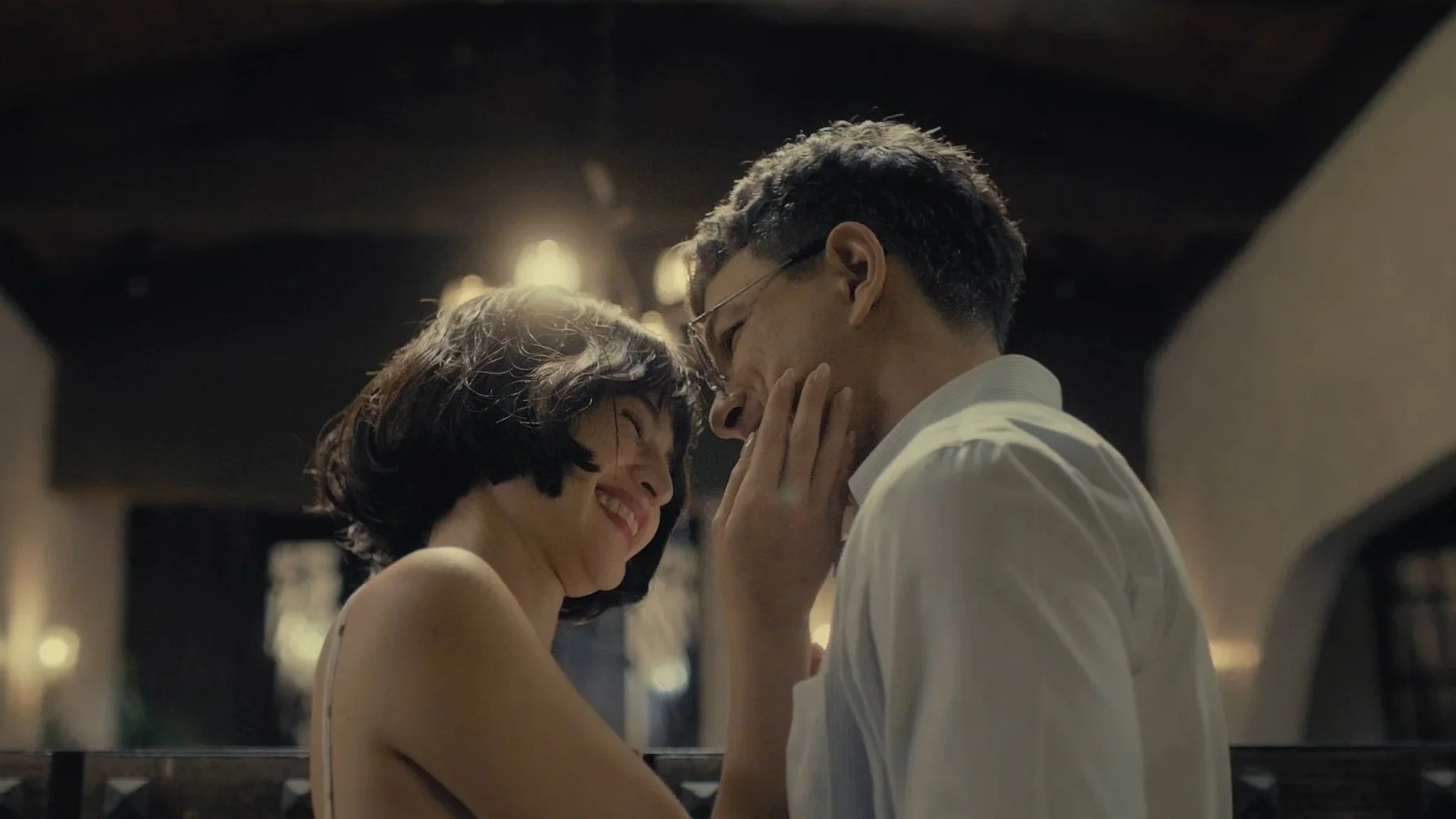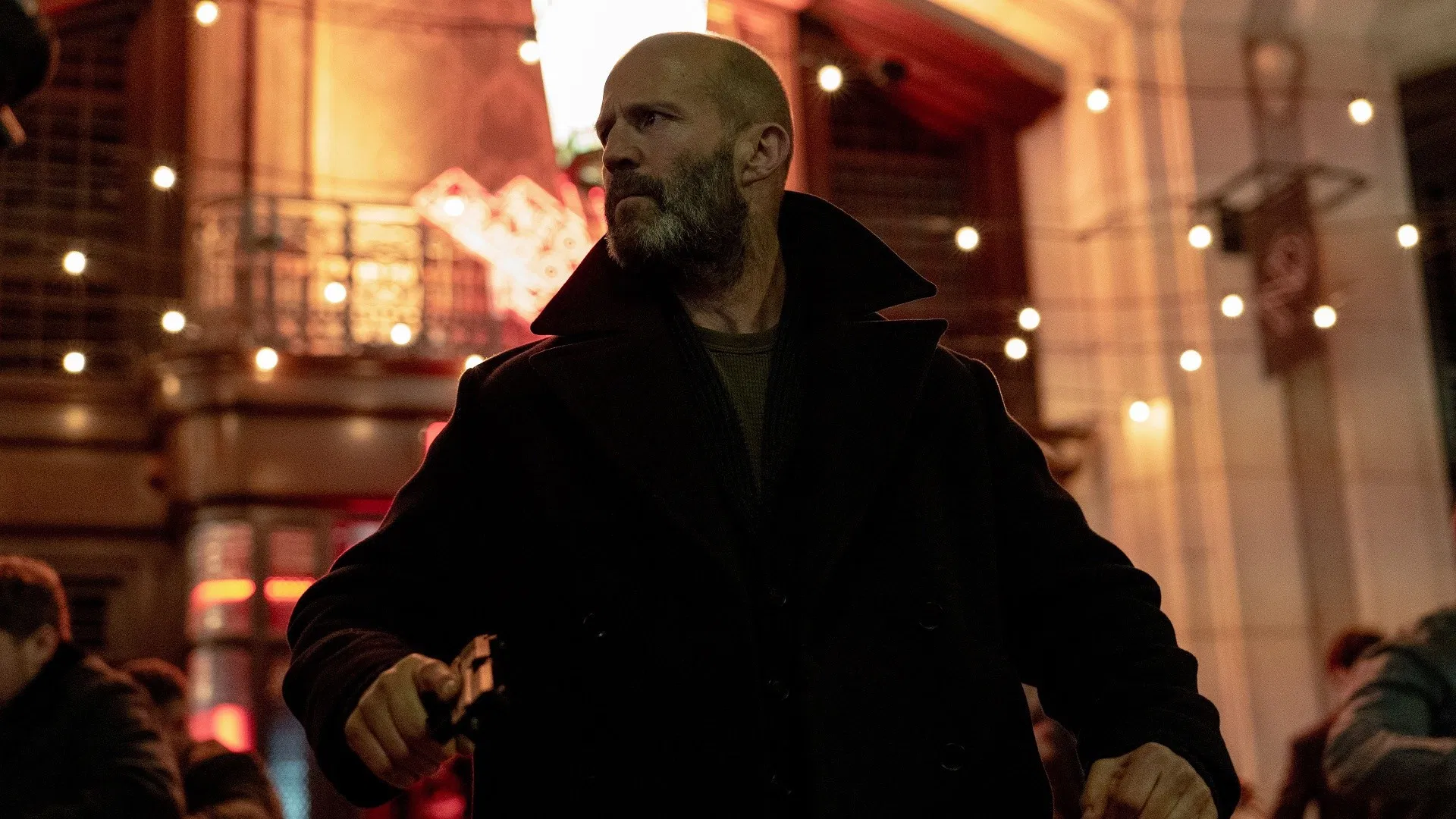‘Eddington' REVIEW: Spit Fights that Feed the System
‘Eddington' REVIEW: Spit Fights that Feed the System
Sheriff Joe Cross (Joaquin Phoenix) gets reminded to wear facemasks | Still courtesy of A24
Reaching for a cellphone during a spare moment takes only seconds, but at one point in Ari Aster’s Eddington, the act stretches into a dramatic crescendo as Sheriff Joe Cross’ hand closes around it with the weight and precision of a man drawing his gun, a motion far more frequent than the gun itself.
It’s a scene that mirrors how laughably bizarre free-floating paranoia and anxieties were dominantly fed by the internet and algorithms during the COVID-19 pandemic, gradually bringing out the worst in us through small but terribly affecting ways. More than providing simple downtime distraction, it also exacerbated people’s suppressed motives and became daily fixtures that fueled contention on all sides.
This is the reality Aster captures with startling accuracy in his fourth feature, Eddington, framing his cleverly designed Western satire as both a time capsule of the era and a scalpel to cut it open.
With its constant nods to 2020, the film leaves no doubt that it dives headlong into the scrap heap of polarization that thrived during the pandemic. Joaquin Phoenix shines as Joe Cross, the town’s sheriff and a devoted husband whose conservative leanings seep into the sentimental tactics he uses to rail against masks. Since the virus hasn’t yet reached their town of Eddington, New Mexico, he insists masks are pointless — even griping that they make it harder to breathe. To him, the slogan plastered on his truck, “Your being manipulated,” isn’t a typo but a truth justified in his eyes.
Deputy Guy Tooley (Luke Grimes), Sheriff Joe (Joaquin Phoenix) and Deputy Michael Cooke (Michael Ward) as they try to manage the town’s Black Lives Matter protest | Still courtesy of A24
Pedro Pascal plays the forward-looking techie Mayor Ted Garcia, who is understandably appalled that the very person railing against preventive protocols is the town’s own sheriff.
The conflict between mayor and sheriff seems to cut deeper than politics, reaching into the personal through Joe’s wife, Louise — a role Emma Stone animates with peculiar charm, her odd hobby of crafting questionably designed dolls serving as a fitting extension of the film’s offbeat tone.
Joe, meanwhile, mistakes twelve Facebook reactions on a post glorifying his anti-mask stance as validation enough to launch a mayoral campaign against Ted. In a hilariously tone-deaf move, he even tries to put a disclaimer about being asthmatic.
The characters feel at once highly specific and broadly archetypal, their traits uncannily reminiscent of people I’ve known in real life. Given Aster’s reliable eye for detail — the same rigor that shaped modern horror through Hereditary and Midsommar — this comes as no surprise. The script is tight and bounces smoothly through each arc, with outstanding camerawork and an eerie ambient soundtrack providing equal legwork. Together, these elements allow the characters to inhabit that space between oddity and familiarity which the film so deftly measures.
That said, the setting of Eddington is painted with the same satirical strokes: people applauding the bare minimum of civic duty, unattended laptops streaming videos with overlong titles, and teenagers wielding their phones like flashlights, casting beams on everything but the dark. Who can really blame them? If it doesn’t look good on Instagram or Snapchat, diminished quality makes it irrelevant.
In one scene, two friends — Eric, the son of Mayor Ted Garcia, and Brian — casually debate what Brian should send to a girl on Snapchat while strolling down the sidewalk, tugging on masks only when a suspicious car passes. If “performative” is the biggest buzzword of 2025, this might be the film’s sharpest jab: Brian frantically googling a politically charged book just to impress Sarah — a Black Lives Matter protestor more invested in broadcasting her advocacy than grounding it in radical pragmatism — is played so straight it becomes so hilarious in its developing outcome.
Just when I thought small easter eggs and cheeky callbacks couldn’t get any more delightfully goofy, Austin Butler pulls yet another persona from his sleeve. As Vernon Jefferson Peak, he nails the conspiratorial posture, running a website that looks straight out of the early 2000s, complete with tacky magic-ball ad energy. Even the way he positions his hand while speaking could almost convince you that pain is never just coincidence.
Joe and Mayor Ted (Pedro Pascal) confront each other | Still courtesy of A24
In Eddington, where phones are everywhere, information is everywhere too. Verified or not, if it serves someone’s self-interest, it becomes fact. Joe’s mother-in-law, Dawn, (Deidre O’Connell) even prints her own version of the truth and requests that it should be read aloud at breakfast, I suppose it's a daily ritual for those with nothing better to do than stay indoors with their thoughts as the circular source of insight.
Although, what happens outside is scarier — and funnier. Deputies Guy and Cooke struggle to manage protesters who wield book excerpts like weapons, only to turn on each other in a scuffle that Cooke ends up breaking up himself. If a camera is rolling anywhere, the chance of an out-of-context video surfacing online is almost a given. Aster stages these COVID-19 scenarios with blunt clarity: what seem like jabs are really tiny snapshots of reality, moments that, in hindsight, are as silly as they are true.
And what’s real but unseen is that, beyond the personalities of Eddington, invisible forces hum beneath the surface, none louder than technology. Mayor Ted, the self-styled tech junkie vying to run again for mayor, secretly plots to build a data center while blasting campaign parties with oversized speakers and token social-distancing props.
In one of 2025’s most intense scenes, set to the soaring backdrop of Katy Perry’s “Firework,” Joe storms in to shut it all down as the music rattles the town into chaos. Aster’s brilliance plants itself here: the sugary pop anthem collides with the simmering hostility between Joe and Ted, their confrontation staged in piercing calm. Joe’s silence brimming with barely contained rage.
This marks Eddington’s turning point, where Ari Aster’s signature chaos, first tinkered with in Beau Is Afraid, erupts in full force. What begins as a grand offshoot of various absurdities collapses into a hellscape in the middle of nowhere, spiraling further with the sudden arrival of an extremist faction, Antifa, that drags the town into its own tailspin.
The film swerves into a violent, full-blown thriller, so gripping I lost all sense of its big runtime until the credits rolled. Aster’s filmmaking here feels at once razor-edged and refreshingly inventive, the camera tracks with poise and editing that allows each bursting frenzy to be stitched into a seamless, escalating rhythm.
For all its chaos, what unsettles the most isn’t the dizzying madness, but the plain familiarity within it. We have grown desensitized and that problematic numbing is a difficult habit to unlearn. Eddington shows us many things we’ve all encountered, in one way or another, just as they are.
At first glance, it may be tempting to dismiss its density as centrist or muddled in its message, and while those readings can be made, I see the opposite. It boxes in both sides of the spectrum — tinfoil antivax right-wingers and holier-than-thou, virtue-signaling leftists — and pokes them with a stick, leaving them wounded by their own hypocrisies. Nothing feeds the system more than misguided posturing, which drains the very energy that could destroy it.
Sheriff Joe Cross (Joaquin Phoenix) shoots at Antifa soldiers | Still courtesy of A24
The film captures 2020 America in an honest way, exposing how priorities were deeply mismatched as the capitalist system, aided by tech oligarchs puppeteering algorithms, burrowed further underground. These forces are hardly seen in the film, but they are felt through the many screens that fill it. Not far into the story, we see Joe watching YouTube tips on persuading his wife to have another baby, yet by the end, the same technology cradles him in bed like one. In the same way, the content consumed by the characters doesn’t just fuel their emotions, it traps them in echo chambers that do the thinking for them.
Who’s at the top often has little to do with what people are actually facing in front of them. The more power you hold, the less likely you are to face consequences. Joe is saved by a museum display of Native American ancestral bones, and as much as I don’t want to overthink it, it’s hard to see this as coincidence. It slyly reflects how hierarchies serve race and class above all. Every character in the film meets their own kind of demise, but in the end, the ones pulling the strings are hardly seen and still emerge as victors in a modern western where a receipt replaces tumbleweed in a tense confrontation.
If there’s any battle worth watching, Eddington makes clear it’s not fought with candor but with self-interest dressed up as a collective sightseeing of progress, a spectacle so contrived that it’s easier to laugh at than to take seriously. And that’s the problem we’re facing at large, the film is a microcosm perceptibly captured from the reality we currently live in. Ari Aster pulls it off with such ruthless intent that it’s bound to split audiences once more, snapping at the hands that try to tame it. That, perversely, is its brilliance.
The film’s anything but funny, yet, at the same time, it really is. In the end, what passes for radical growth are spit fights that feed the very system we pretend to oppose, a chaos trained by its own empty theatrics. Even AI-generated slop could spot the irony, which makes it all the more damning that we can’t.






















